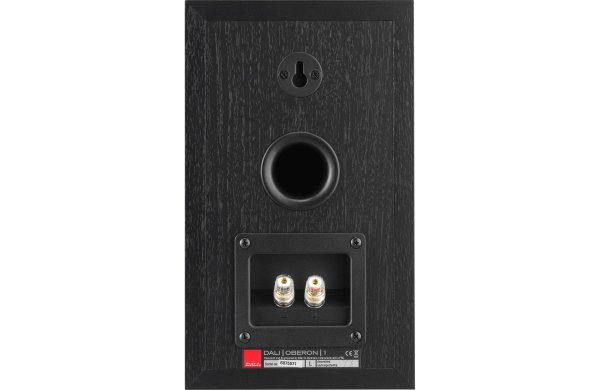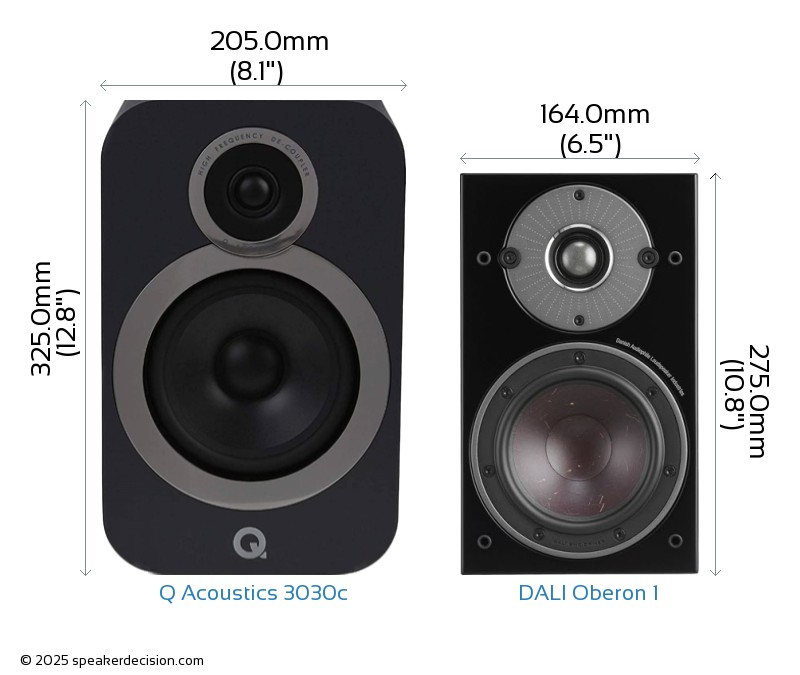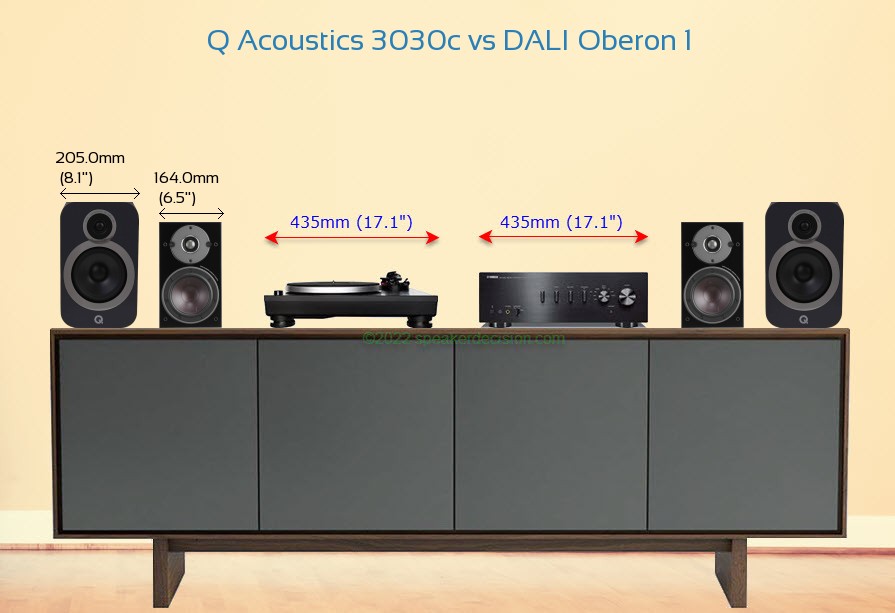In this review, we will be comparing 3030c and Oberon 1, two Passive Bookshelf speakers from Q Acoustics and DALI.
Let's have a brief look at the main features
of Q Acoustics 3030c and DALI Oberon 1 first before getting into our more
detailed comparison.
Q Acoustics 3030c Key Specs
- 2-way Design
- 1" decoupled Tweeter
- 5.5" Coated paper Woofer
- 48-30k Hz Frequency Response
- 86.5 dB Sensitivity
- Impedance: 6ohms
- Power Range:25-90watts
- Weight:7.50kg
- Dimensions (H x W x D): 325.0" x 8.1" x 13"( 325 x 205 x 329mm )
DALI Oberon 1 Key Specs
- 2-way Design
- 1.125" Soft-Dome Tweeter
- 5.25" Wood Fiber Woofer
- 51-26k Hz Frequency Response
- 86 dB Sensitivity
- Impedance: 6ohms
- Power Range:25-100watts
- Weight:4.18kg
- Dimensions (H x W x D): 275.0" x 6-7/16" x 8-15/16"( 275.0 x 164.0 x 228.0mm )
What size room are the Q Acoustics 3030c and DALI Oberon 1 speakers good for?
The size of the room in which you are planning to use these loudspeakers is an important decision
factor. Here we have compared their suitability to various sizes of environments considering their size
and max power parameters:
| Listening Environment* |
Q Acoustics 3030c |
DALI Oberon 1 |
| Near-field |
Average |
Average |
| Small Room |
Good |
Good |
| Mid-size Room |
Average |
Average |
| Large Room |
Poor |
Poor |
| Very Large Room |
Bad |
Bad |
(* Approximate Room sizes: Small < 100sq. ft / 9 m2,
Mid-size: 100-220 sq. ft / 9-20 m2, Large 220-400 sq. ft / 20-36 m2, Very Large: >
400 sq. ft / 36 m2.
Average Floor Height: 9" / 2.7m. Typical room sizes differ from country to country, and the actual
listening experience changes depending on floor height, room shape, surface materials, listening
position, speaker locations, etc.)
In the following sections, we will get into more detail in order to better understand how the Q Acoustics 3030c and DALI Oberon 1 compare and hopefully end up with enough arguments to decide which one of these loudspeakers is the better choice for you.
**This post contains affiliate links, and I will be compensated if you make a purchase after clicking
through my links. As an Amazon Associate I earn from qualifying purchases.
Drivers
Both 3030c and Oberon 1 are 2-way speakers.
| Driver |
Q Acoustics 3030c |
DALI Oberon 1 |
|
Driver Setup
|
2-way
|
2-way
|
|
Tweeter
|
1-inch
|
1.125-inch
|
|
Midrange
|
- |
- |
|
Woofer
|
1 x 5.5-inch
|
1 x 5.25-inch
|
3030c features a 1" decoupled Tweeter and 1 x 5.5" Coated paper Woofer with a Crossover frequency at 2500Hz. On the other hand, the Oberon 1 features a 1.125" Soft-Dome Tweeter and 1 x 5.25" Wood Fiber Woofer with a Crossover frequency at 2800Hz.
Frequency Response
3030c has a frequency range of 48-30k Hz whereas Oberon 1 has a frequency range of 51-26k Hz. With a minimum frequency of 48Hz, the 3030c can go slightly deeper then the Oberon 1's min frequency of 51Hz.
Below graphs depict how these two speakers compare with the max, min and average values of the Min and Max Frequencies of other speakers in the Bookshelf class in our database.
Low Frequency
Bookshelf Speakers
High Frequency
Bookshelf Speakers
None of these speakers achieves full range experience which is commonly agreed as 20Hz-20kHz. In order to achieve lower lows / deeper bass, we recommend you pair these with a subwoofer. Visit our Powered Subwoofers section to find out more about the available options.
Impedance and Sensitivity
3030c and Oberon 1 have the same Impedance of 6 ohms but where they differ is the sensitivity levels. 3030c sensitivity is rated at 86.5 dB and the Oberon 1's is at 86 dB. This 1 dB difference makes the Q Acoustics 3030c a more sensitive speaker compared to DALI Oberon 1, hence will play louder with the same amount of watts.
Sensitivity
Bookshelf Speakers
Power Range
Power
range is the range of input power in watts RMS that a loudspeaker is designed to handle. While using
an amplifier within this range ensures the nominal performance , inputting a power that is higher than the
max wattage can result in a damaged speaker.
3030c can handle a max power of 100 watts RMS from the amp the whereas 3030c has a max power handling value of 90 watts RMS , 10 watts less than the Oberon 1.
Keep in mind that a higher max power handling value doesn't necessarily make that a louder speaker
compared to a lower max handling speaker. Loudness or the sound level is also impacted by parameters
such as Impedance, sensitivity and system efficiencies.
Input Type and Bi-Amping / Bi-Wiring
3030c features Post type posts and Oberon 1 has a Post type posts. None of these speakers feature bi-amping/bi-wiring.
 DALI Oberon 1's Post terminals
DALI Oberon 1's Post terminals
Cabinet Type and Port Position
Both 3030c and Oberon 1 have rear firing ports. Rear ported speakers generally need more room between the backside of the speaker and the wall compared to sealed and front/bottom ported speakers. Placing the speakers too close to the walls may cause the bass to sound boomy.
If you are limited in space and can't get the speakers away from the backwall, check our Speakers with Front Firing Ports page.
Physical Specs
Size of a speaker can sometimes become an important decision factor due to space constraints or in some cases purely for esthetic reasons. In this section, we are going to compare Q Acoustics 3030c's and DALI Oberon 1's external dimensions. Q Acoustics 3030c has external dimensions of 325 x 205 x 329mm ( 12.8 x 8.1 x 13inch) whereas DALI Oberon 1 has external dimensions of 275.0 x 164.0 x 228.0mm ( 10-13/16 x 6-7/16 x 8-15/16inch) .
Q Acoustics 3030c is clearly the larger of the two speakers. Its body is 41mm wider, 50mm taller and 101mm deeper than DALI Oberon 1.
Below you can see the front view size comparison of Q Acoustics 3030c and DALI Oberon 1 in scale.
 Comparison image of Q Acoustics 3030c and DALI Oberon 1 Size and External Dimensions
Comparison image of Q Acoustics 3030c and DALI Oberon 1 Size and External Dimensions
Base Surface Area Comparison
Base surface area of a loudspeaker may become a determining factor when the space in your room or desk is limited.
The base surface area of the Q Acoustics 3030c is approximately 674.5cm2 / 104.5inch2 and base area of the DALI Oberon 1 is approximately 373.9cm2 / 58.0inch2. The 3030c requires 80% more surface area than the Oberon 1 which gives it a small disadvantage on placement in tight spaces.
Here is an another comparison that shows both speakers on a BDI Octave Media Cabinet, next to a standard size amplifier and turntable in scale:
 Size Comparison image of Q Acoustics 3030c and DALI Oberon 1 on a Media Console
Size Comparison image of Q Acoustics 3030c and DALI Oberon 1 on a Media Console